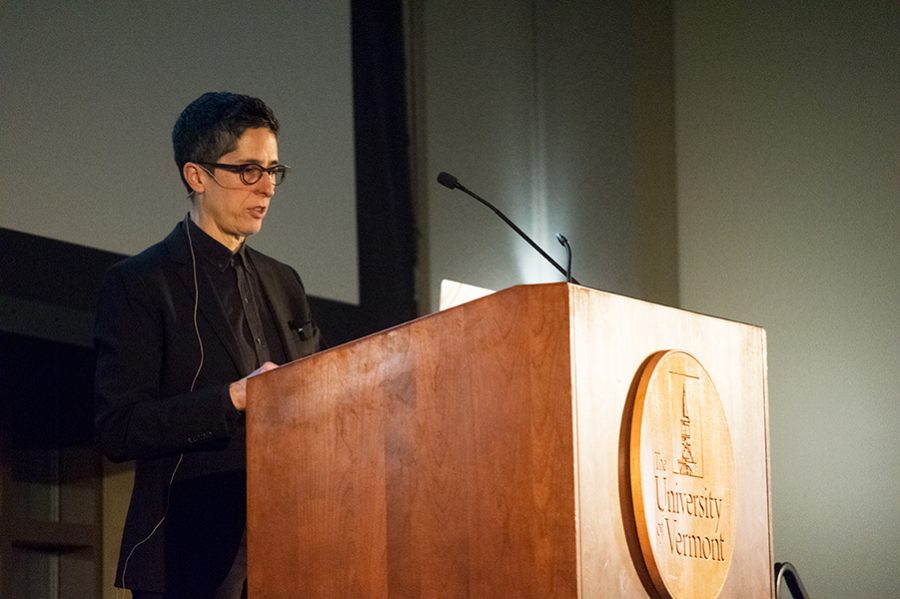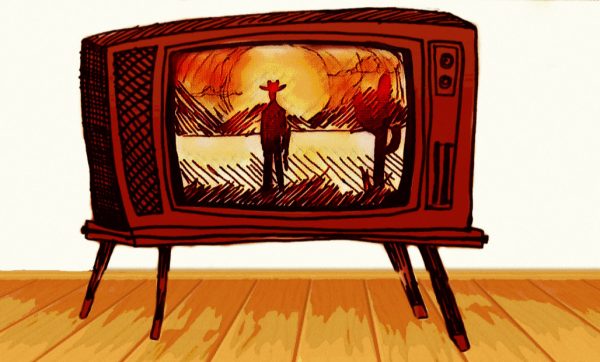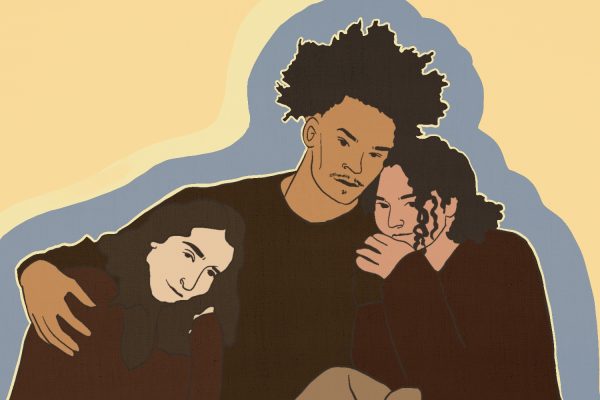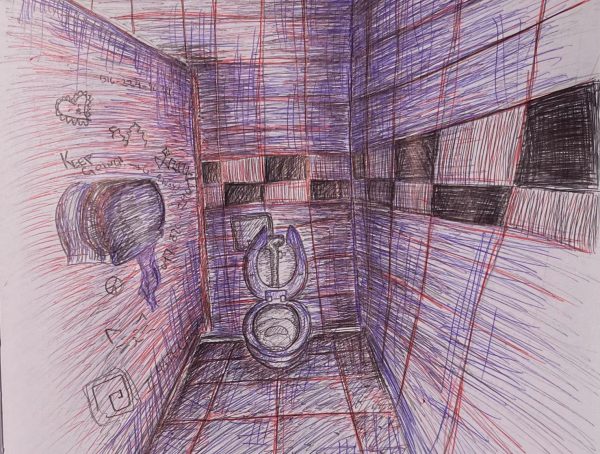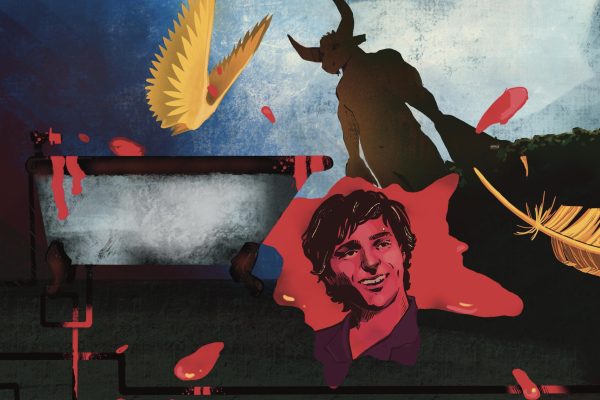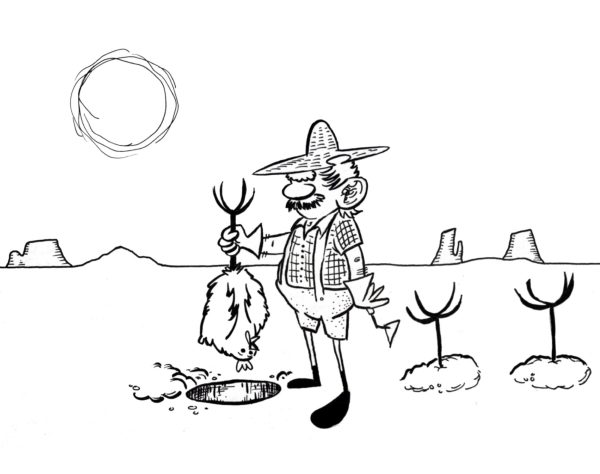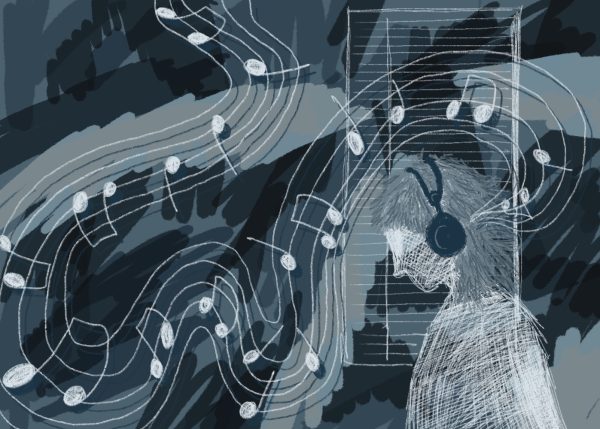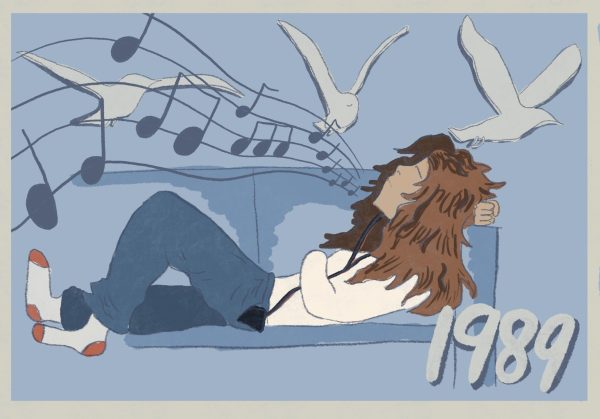Acclaimed artist talks craft and cartoons
Alison Bechtel speaks to the audience gathered in the Silver Maple Ballroom Feb. 21.
February 28, 2018
A hushed, reverent silence fell over the crowd, as soon as a woman with short, spiked hair and glasses approached the podium.
Vermont author and artist Alison Bechdel, the night’s speaker, took the stage and immediately made jokes about the large crowd size and all of the familiar faces. The room suddenly felt smaller and more intimate—the magic of Bechdel’s personality.
The Vermont Cartoonist Laureate spoke of her artistic development, her journey as a queer cartoonist and the themes of her work and life during her Feb. 21 talk in the Davis Center Silver Maple Ballroom.
She promoted her current exhibit, which is on display at the Fleming Museum: “Self-Confessed! The Inappropriately Intimate Comics of Alison Bechdel.”
Honesty and vulnerability are core parts of Bechdel’s work. She described her work as a “burial vault,” and the Fleming Museum called her a “self-archivist” in its exhibit.
I’ve kind of spent my life making a space for myself to tell my own personal story.
— Alison Bechdel
“Bechdel’s artistic development has from her earliest years been a seemingly inevitable expression of her authentic self,” said Dan Fogel, chair of the english department. He has been teaching Bechdel’s work for about 10 years, he said.
Bechdel graduated from Oberlin College in Oberlin, Ohio with degrees in studio art and art history in 1981. She said her relationship with art is complicated.
“I was always suspect of art,” Bechdel said. “Especially when I came out as a lesbian.”
“I started to feel like the whole ‘fine arts’ thing was elitist and crazy, and I wasn’t going to have any part of it. I hated art, I wasn’t an artist — I was a cartoonist.”
Bechdel has since changed her tune and says she now considers herself an artist.
“I want to make my life into art,” she said.
Bechdel uses her cartoons to create a space that was not always achievable in her real life.
“I feel like I’ve worked so hard to explain myself as a lesbian, as a queer person, and I’ve kind of spent my life making a space for myself to tell my own personal story,” Bechdel said.
Using her own personal experiences in her comic strip “Dykes to Watch Out For,” published in feminist and queer magazines beginning in 1983, has greatly contributed to queer visibility.
“Sometimes I think my long career with ‘Dykes to Watch Out For’ was just a way to carve out a little space so I could talk about just myself,” she said.
The personal narrative that is a key part of her art isn’t just cathartic for Bechdel — for many viewers, the universality of her work is in its specificity.
First-year Grace Doherty said Bechdel’s vulnerability in “Fun Home,” her graphic memoir, helped her through tough times in her own life.
Bechdel’s honesty in her work inspires social change, Doherty said.
“When people are specific about their stories, you can hone in on what they were feeling at that time, so I think that is helpful,” she said.
Bechdel’s cartoons provide a place in art where people can see themselves where they may have previously felt unseen.
“Reading ‘Fun Home’ was a really cool experience and I recognized a lot of myself in it,” senior Eileen Parks said. “It’s really nice to have queer art so prominently shown and to have that be a thing that people are talking about.”
Bechdel stopped making “Dykes to Watch Out For” during the 2008 Democratic Primary between Hillary Clinton and Barack Obama, she said.
At the time, Bechdel had been happy to be done with the strip, she said.
“I had done that strip for 25 years and it was constant deadlines,” Bechdel said. “It was exhausting.”
After the election of President Donald Trump, Bechdel rebooted the characters to hear what they would have to say about the current political climate.
On a large projector screen, Bechdel pulled up strips of her characters in the wake of the 2016 election writing letters about the refugee crisis to Congress and arguing with their conservative family members.
“I felt comforted to have my characters back,” she said to the crowd.
“So did we,” someone shouted back.


